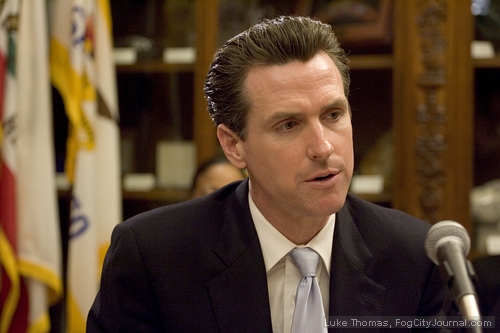
The Grinch who stole Christmas? San Francisco Mayor Gavin Newsom
said he will not spend a veto-proof appropriation passed by the Board of Supervisors
intended to prevent layoffs during the holiday season.
Photos by Luke Thomas
By Luke Thomas
November 29, 2009
Following several weeks of intense lobbying, rallies and protests, frontline SEIU Department of Public Health employees won a holiday-saving two-month layoff reprieve last week when the San Francisco Board of Supervisors passed a veto-proof appropriation in the amount of $1.9 million.
But the celebratory response by SEIU employees in attendance during the two-hour impassioned debate will be short-lived: Mayor Gavin Newsom signaled his refusal to spend the reduced appropriation citing a $45 million carryover deficit in the current fiscal year, and a projected $522 million deficit in the next fiscal year.
“Mayor Newsom cannot spend funds that the City does not have,” Newsom spokesperson Joe Arellano said. “[Tuesday’s] Board action didn’t provide any new money – it takes dollars already being used to pay other employees’ salaries.”
“No layoffs are easy, especially during the holidays,” Arellano added. “Unfortunately, everyone is feeling the crushing effects of the economic downturn, including the City and County of San Francisco.”
But not everyone employed by the City has been impacted and SEIU members, many of whom are the lowest paid, have shouldered more than their fare share of the cost-cutting burden, according to SEIU 1021 spokesperson Robert Haaland.
“Even if one argues there is no revenue identified and that layoffs are needed to deal with the budget crisis, why target the lowest paid workers, who are all women and people of color who make around $30 to $40 thousand, when there are over nine-thousand workers in the City who make over $100 thousand?” Haaland said. “Why solve the budget crisis on the backs of the most vulnerable?”
“While particularly stark in the last year, the observed growth in executive management and supervisory positions – at the expense of frontline service workers – continues an existing trend towards an increasingly management-heavy city government. In the last ten years, since the 1998-99 budget year, executive management positions have grown by 50 percent,” Haaland added.
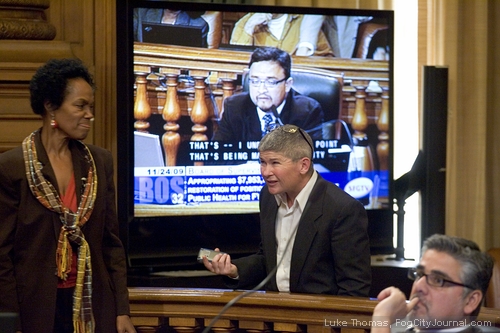
Robert Haaland discusses the crisis facing SEIU employees with Supervisor Sophie Maxwell.
Maxwell, who had previously voted against granting a holiday reprieve,
voted for the reduced appropriation.
To close this year’s unprecedented $575 million budget deficit, the Board of Supervisors in June approved a combination of negotiated budget cuts that included layoffs, employee bumping and salary downgrading in the Department of Public Health. But several supervisors are now openly expressing regret with the budget agreement because the layoffs have disproportionately impacted low-income minorities working on the frontlines of public health delivery. They are calling on Newsom to revisit the budget agreement to make the necessary adjustments that “shares the pain” more fairly and equitably.
“This is creating a huge disruption in our healthcare system and our Healthy San Francisco program,” said Budget Committee Chair John Avalos. “Moreover, most of the people who are providing these services are women and people of color.”
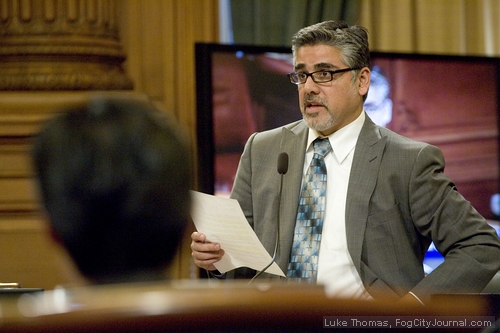
Budget Chair John Avalos
Avalos, who is in the difficult position of defending the budget agreement while also supporting the appropriation, said the City could readjust this year’s budget with reliance on yet to be released Federal monies that the State of California has approved for municipalities, including the City and County of San Francisco.
“When that plan has been approved,” Avalos said, “we know that we will have DPH money coming back to us to be able to prevent these layoffs and pay for these workers.”
Supervisor Sean Elsbernd countered that monies approved by the State, which faces a $20 billion deficit, cannot be relied upon to reach the City.
“We have no idea if this money is going to come in, nor do we know how much is going to come in,” Elsbernd said. “Trying to spend this money is akin to spending your lottery winnings before you’ve even scratched the lottery ticket.”
Even if all eleven Board members approved the appropriation, Newsom would still not spend the money, Elsbernd said.
“You are giving these employees false hope,” he added. “That is more than cruel and unusual punishment. This is not going to happen regardless of whether or not we all vote for this. I think we need to stop with this charade and know what we have to do.”
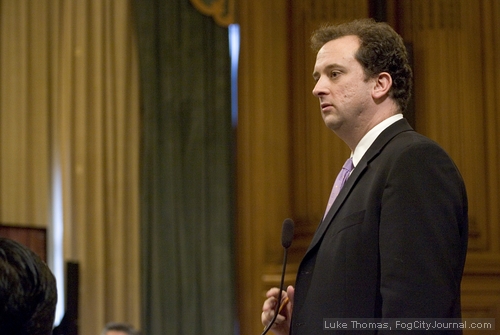
Supervisor Sean Elsbernd
Supervisor Bevan Dufty, who sits on the Budget and Finance Committee and voted for the appropriation, apologized for the budget agreement saying it did not address the issue of equity and fairness in layoff selection.
“Those of us on the [Budget] committee have to accept that our product ultimately did not address adequately this issue,” he said.
“The reality is that, at the heart of what we’re talking about here, is the issue of fairness,” added Supervisor David Campos. It’s not fair to say to one group of employees “that we’re going to give you everything you asked for… and then at the same time tell another group of employees ‘I’m sorry, but you’re going to have to sacrifice – we don’t have the money to help you.’ I think it’s fair to ask everyone to share the pain and make the sacrifice. Let’s treat every employee fairly. Let’s do right by all of them so that all of us can have an equal share of this burden.”
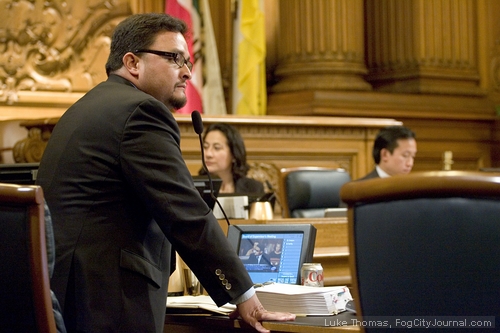
Supervisor David Campos
Taking on a more agitated and accusatory tone, a fiery Supervisor Michela Alioto-Pier told colleagues, “We are dealing with these problems right now because of the Budget Committee and the Budget Committee’s recommendations. If there was a real intent to save these jobs before the political pressures that have been put on us in the last three or four weeks, then it should have been done before we got here today.”
“We are not balancing our budget on the backs of these people out here. What we are doing is dealing with a budget that this body gave us,” she added.
Alioto-Pier said too much hope was being placed on the City receiving funds from the State. “I will believe it when I see it,” she said. “All I have seen is the State nickel and diming us. All I have seen of them is taking money away from us. This is not a joke. We are not living in a fantasy land.”

Supervisor Michela Alioto-Pier
Responding to Alioto-Pier, Avalos said he accepts full responsibility for the budget agreement he and Board President David Chiu struck with Newsom but countered he has been consistently saying, “We need to fix the budget.”
“I believe we are being consistent with our values in moving this [appropriation] forward,” he said, “and we did not have every agreement about what was in this budget that we approved, but we’re trying to reverse that.”
Though the appropriation ordinance originally asked for a $7 million restoration allocation, the remaining $5 million will be discussed at the full Board on December 15.
The mayor is obligated to expend monies appropriated by a veto-proof legislative majority, but Newsom, as he has done on several previous occasions, is expected to ignore the Board’s will.
There was no discussion centered on how best to equitably deal with next year’s $522 million shortfall. Several supervisors across the political aisle in May said they would support a shared sacrifice budget wherein a weighted combination of across the board salary cuts and workday furloughs is implemented. The proposal would save all jobs and services from the guillotine but would require Newsom to invoke a declaration of fiscal emergency to effectuate mass changes across all memorandum of understanding contracts.
To the question of whether Newsom is considering across the board salary cuts, Arellano told FCJ: “The Mayor believes that everything has to be on the table this year, however, he does not believe in across the board cuts.”



 The Hunger Site
The Hunger Site
November 29, 2009 at 4:02 pm
The basic budgetary process at City Hall is flawed and outdated. Its backwardness encourages theatrics by the supes, the mayor, and special-interest groups.
In the end, all the actors come out looking myopic and foolish. The tax-payers are not amused.
In the next few years, the dysfunctionality of the process will become even more glaring as the city’s financial crisis deepens.
Here are some sensible suggestions by Jeff Adachi for improving the process:
http://www.sfgate.com/cgi-bin/article.cgi?file=/c/a/2009/11/25/ED7A1APE4T.DTL